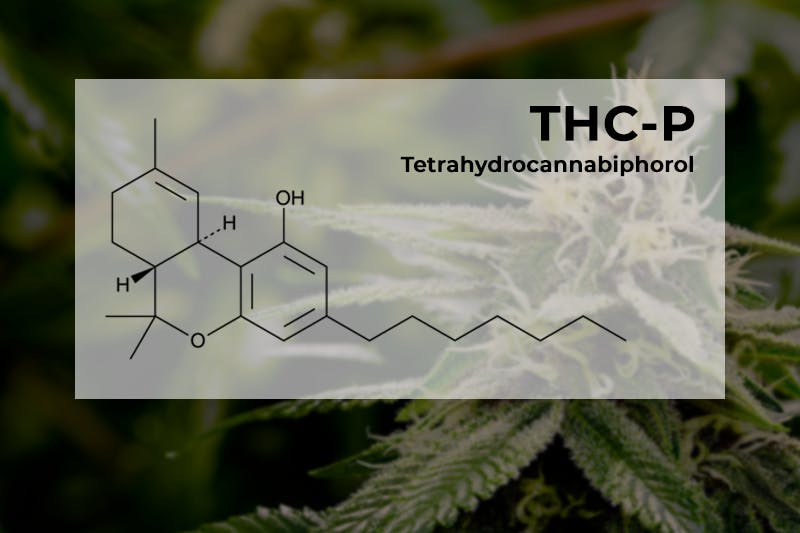THCP is a recently discovered cannabinoid found in some strains of marijuana at very low levels and can be produced in the lab by modifying legal hemp-derived CBD. It was accidentally discovered by Italian researchers while analyzing marijuana strains.
The full name of THCP is delta-9-tetrahydrocannabifol, sometimes shortened to delta-9 THCP or THC-heptyl. Abbreviations include THCP, THC-P, and THCp. Some retailers call this delta p.
After the huge commercial success of delta 8 THC, the cannabis industry discovered a variety of hemp-derived cannabinoids that could compete with delta 9 THC in traditional marijuana. These cannabinoids – Delta 8, Delta 10 THC, and HHC – are all popular in the diverse cannabis market, and THCP is poised to join them.
THCP has the potential to offer powerful new highs for recreational users, but it may also bring new therapeutic benefits to medical patients. Researchers are just beginning to explore the potential of THCP.
THCP is an organic cannabinoid (or phytocannabinoid) that closely resembles delta-9 THC, the most abundant cannabinoid in most marijuana strains. THCP was first identified in certain marijuana strains, but it can also be produced in the lab by chemically manipulating CBD extracted from legal cannabis plants.
In fact, to produce enough THCP to have real commercial value, Must Real cannabis flowers don’t have enough to extract cost-effectively, so they have to be made in a lab.
The molecular structure of THCP is very different from Delta9. It has a longer alkyl side chain (a “tail” of atoms extending from the bottom of the largest part of the molecule). The oversized side chain (7 carbon atoms compared to 5 carbon atoms in delta 9) allows THCP to more readily bind to human CB1 and CB2 cannabinoid receptors. This means that its effects are likely to be more potent in the brain and body.
Most of what we know about THCP is 2019 survey by a group of Italian scholars who introduced it to the world. Little is known about the possible safety issues and side effects of THCP, except that it can be speculated based on the effects of other forms of THC, as human studies have not yet been conducted.
The Italian researchers who discovered organic THCP found in experiments with cultured human cells that THCP binds CB1 receptors 33 times more effectively than delta 9 THC. CB1 receptors are the most important cannabinoid receptors for producing psychoactive effects, but THCP also binds more readily to her CB2 receptors.
That doesn’t mean THCP will be 33 times higher than traditional delta 9. There is probably a limit to the ability of cannabinoids to stimulate endocannabinoid receptors, and everyone responds differently to each cannabinoid anyway. Some of its 33-fold binding affinity may be wasted on already overloaded cannabinoid receptors, but for many people THCP may be more potent than delta 9 THC. Seems expensive. It might get you very expensive.
Scientists who have identified THCP believe that the presence of small amounts of THCP in some marijuana strains makes them more intoxicating than other strains that contain similar or higher levels of delta-9 THC. He says he can explain why it looks. In the future, cannabis breeders may create new strains with higher THCP concentrations to accentuate their effectiveness.
KOI THC-P Vape Cartridge
Koi THC-P Vape Cart combines powerful cannabinoids with Delta 8 and THC-O to provide total body calm and deep relaxation. The cart contains 1 gram and will work with any 510 battery. They are available in 3 strain/flavor options and have been fully tested by a 3rd party lab.
What are the effects of THCP?
THCP binds so well with cannabinoid receptors that it could produce effects similar to, but perhaps even more pronounced than, delta-9 THC. To do so, a standard cannabis mouse experiment was performed. Mice exhibited reduced activity levels at low doses and became cataleptic (trance-like state) at high doses. THCP appeared to act as an effective pain reliever even at high doses.
THCP’s ability to bind so effectively with the cannabinoid receptors in the body makes it extremely valuable not only as a recreational high, but also for pain relief, nausea relief, and helping the user sleep. There is a possibility. Although THCP has not yet been fully studied, it is likely that this cannabinoid’s unrivaled binding affinity with human receptors makes it particularly valuable in the treatment of those and other conditions.
In fact, trace (and previously unnoticed) amounts of THCP in existing marijuana strains may be responsible for some of cannabis’ known healing powers. In 2019, the scientist who discovered THCP said, “The discovery of THC-like phytocannabinoids, which are very potent, may shed light on several pharmacological effects that are not solely attributed to them. There is.” [delta 9 THC]with marijuana.
Of course, THCP’s strong binding affinity can also magnify typical undesirable THC side effects, such as dry mouth and eyes, anxiety and paranoia. It can even introduce new risks to users. But until we see results in human studies, it’s mostly speculation.
THCP is very new. There are no serious studies (or much real-world observations) that describe our experience with using THCP as a standalone cannabinoid. Not many people have used it alone.
For example, how do you feel using THCP and THC-O, or how THCP affects you compared to other common hemp-derived cannabinoids such as delta 8, delta 10, or HHC Again, for the most part, THCP products available today contain a mixture of delta-8 and THCP, or some hemp-derived cannabinoids. Cocktails included. When one cannabinoid is blended with two or three other cannabinoids, it is impossible to extract its effects.
By the way, the same researchers who discovered THCP also found cannabidiphorol (CBDP) in the same cannabis samples. CBDP is a variation of cannabidiol (CBD), but like THCP he has a 7-atom side chain. In the future, CBDP may have deeper therapeutic effects than CBD due to the increased biological activity provided by its chemical structure.

Will THCP show up on a drug test?
It is not known for certain whether THCP causes drug test failures as it has not been studied. However, he has no reason to believe that THCP does not produce in the human body the typical THC breakdown products he finds on standard drug tests used by employers and police.
The gist is very simple. No one knows for sure, so if an employer is testing for marijuana use, THCP, and any form of he cannabinoid THC and other cannabis-derived cannabinoids (safe forms of he CBD ) should be avoided.
Is THCP legal and where is it sold?
Congress has legalized hemp and all its compounds and derivatives. 2018 Farm Bill— as long as it contains less than 0.3% Delta 9 THC. In May 2022, a federal appeals court confirmed that Delta 8 THC is a legal hemp product. The decision is applicable to other hemp-derived products and protects manufacturers, sellers and users from federal enforcement.
But states have begun to act on their own to keep hemp-derived cannabinoids off retail shelves or to limit them to licensed cannabis dispensaries. prohibited or restricted access to However, other countries may follow Oregon’s example and ban all “artificially derived cannabinoids,” including THC-P.
THCP is only gaining ground in the hemp-derived cannabinoid market, and buying it can be confusing. It contains THCP mixed with more common (and cheaper) hemp-derived cannabinoids such as, or it contains a blend of multiple hemp-derived cannabinoids.
THCP-containing vape carts and disposable vapes, as well as oral-use tinctures, gummies, waxy concentrates for dabbing, and hemp infused or coated with THCP (or blends containing THCP). There is a “THCP flower” which is the flower of
THCP products are available from most online retailers that sell other hemp-derived cannabinoid products. They are also sold at head shops, convenience stores, gas stations and some vape shops.


